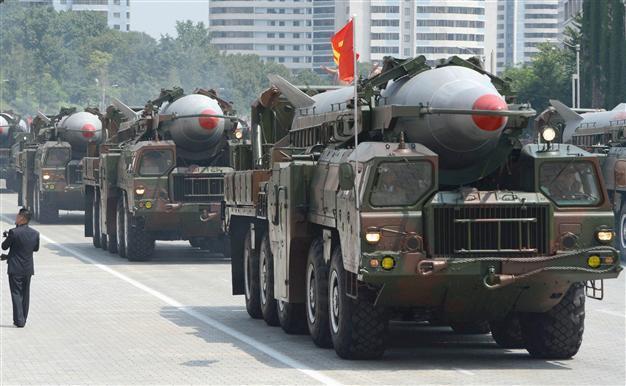North Korea test-fires missiles as Obama hosts summit
SEOUL - Agence France-Presse

In this July, 2013 photo, military trucks carry Rodong missiles during a military parade at Kim Il Sung Square in Pyongyang, North Korea. AP Photo
North Korea test-fired two medium-range ballistic missiles Wednesday, prompting a stern US reaction after President Barack Obama hosted a landmark Japan-South Korea summit aimed at uniting the three nations against Pyongyang's nuclear threat.
Washington condemned the tests as "troubling and provocative", with the US State Department threatening "appropriate measures" for the violation of UN Security Council resolutions prohibiting North Korea from conducting ballistic missile tests.
South Korea's defence ministry said both missiles flew 650 kilometres (400 miles) into the Sea of Japan (East Sea), upping the ante after a series of shorter-range launches in recent weeks.
Ministry spokesman Kim Min-Seok identified them as Rodong-class missiles with a maximum range of 1,000-1,500 kilometres.
"This missile is capable of hitting not only most of Japan but also Russia and China," Kim said, adding they had been fired from mobile launchers near Pyongyang.
North Korea last tested a Rodong missile in July 2009, following UN condemnation of its second nuclear test in May.
Kim said the tests were clearly timed to coincide with Tuesday's summit in The Hague between Obama, Japanese Prime Minister Shinzo Abe and South Korean President Park Geun-Hye.
"The North is boasting its military capability to grab the attention of the international community," Kim said.
Warning that North Korea could be building up towards a major provocation, Kim said the South was closely monitoring the situation, but added there were "no signs" of Pyongyang preparing for an imminent nuclear test.
The South's foreign ministry denounced the "wanton violation" of UN resolutions, saying this could only serve to heighten regional tensions.
"We will come up with responses to the provocations in close cooperation with allies, partners and the UN Security Council," a ministry statement said.
Over the past four weeks, North Korea has conducted multiple launches of short-range Scud missiles and rockets to coincide with annual joint military drills South Korea is conducting with the United States.
South Korea condemned the Scud launches as a "reckless provocation" but stopped short of calling for UN sanctions, given the short range and a recent easing of North-South tensions.
The trilateral summit in the Netherlands came as Obama sought to help repair strained ties between two of the United States' closest Asian allies and key partners in the effort to curb North Korea's nuclear programme.
"Over the last five years, close cooperation between the three countries succeeded in changing the game with North Korea," Obama said.
"Our trilateral cooperation has sent a strong signal to Pyongyang that its provocations and threats will be met with a unified response," he added.
Relations between Tokyo and Seoul are at their lowest ebb in years, mired in emotive issues linked to Japan's 1910-45 colonial rule and a territorial dispute, as well as Japan's use of South Korean "comfort women" as sex slaves in wartime brothels.
Washington fears an open rift would undermine the united stance against North Korea's nuclear ambitions.
Yang Moo-Jin, a professor at the University of North Korean Studies in Seoul, said the tests were a carefully calibrated "show of force".
Yang noted that previous Rodong tests had been launched from North Korea's east coast, and that firing them from near Pyongyang had curtailed their reach into the sea.
"If they had gone closer to Japan, that could have created a serious political backlash, not only from Japan but also possibly Russia," Yang said.
"It's a clear violation of UN resolutions, but the North is willing to risk sanctions to showcase its capabilities," he added.
Six-party negotiations on the North's nuclear programme -- also involving China, Russia and the North -- were suspended in 2009.
Seoul and Washington have refused to consider a resumption until North Korea makes a tangible commitment to denuclearisation.
Wednesday's tests also coincided with the fourth anniversary of the sinking of the South Korean naval corvette, Cheonan, which Seoul said was torpedoed by a North Korean submarine.
The North has always denied involvement in the incident, which killed 46 sailors.
South Korea's military exercises with the United States, which wind up next month, are an annual source of North-South antagonism.
But this year's drills began as relations between Seoul and Pyongyang were enjoying something of a thaw, as both sides held the first reunion for more than three years of families divided by the Korean War.
